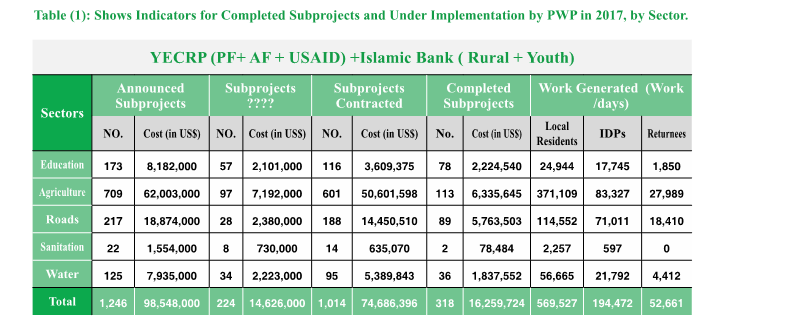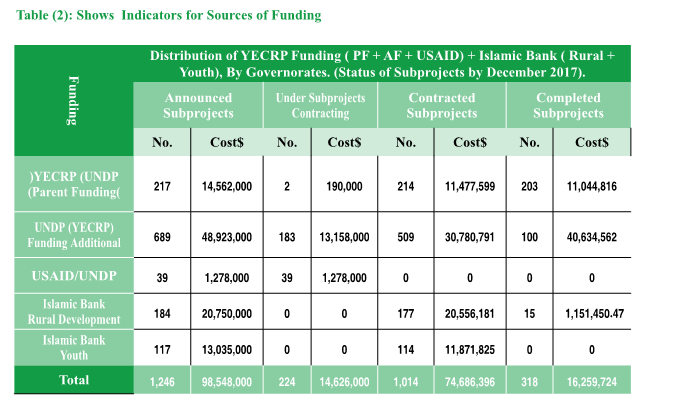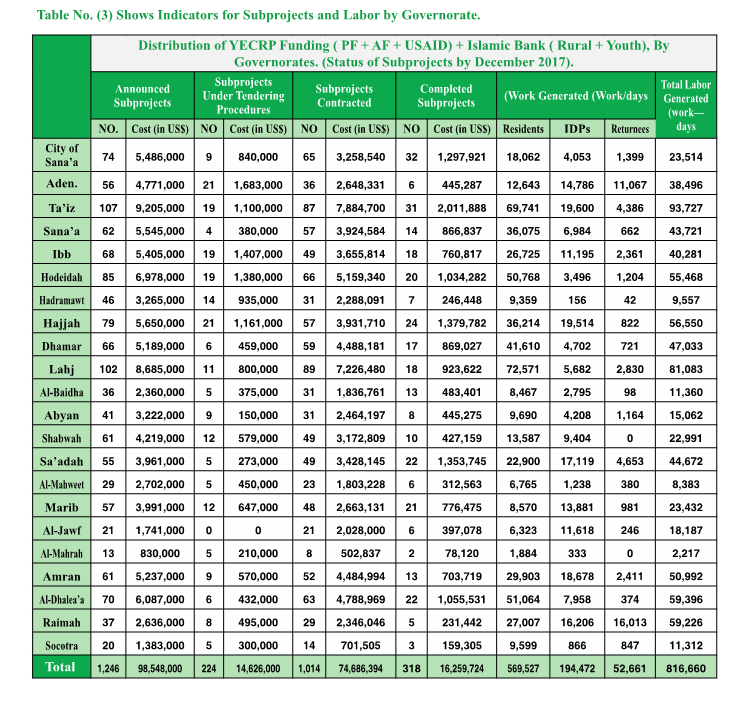In spite of the current circumstances Yemen is experiencing, the Public Works Project, PWP, has not only overcome this challenging situation, but rather adapted so that it continued its efforts in the delivery of services and development projects to all areas of Yemen with no exception - an objective that can readily be seen in the ground.
The PWP has succeeded in implementing subprojects strongly connected to the daily lives of people, such as provision of water, rehabilitation of schools, paving of roads, sanitation services, and protection of agricultural land – with one thing in common: All subprojects are labor intensive designed to create work for skilled and unskilled labor, vital in these critical times. The subprojects are also designed to achieve the objectives of the Yemen Emergency Crises Response Program, YECRP, which is financed by the World Bank and administered by the UNDP.
The PWP closed the year 2017 with huge development achievements touching the lives of many Yemeni citizens, especially the poorest groups, destitute families and those most affected by the current situation in the country. With this, the PWP has become a genuine steward of development in Yemen: An objective it has been pursuing in spite of the challenging conditions and difficulties of the situation in Yemen.
This report reviews the PWP’s 2017 activities and performance. It shows the distribution of subprojects by sectors and governorates, work opportunities created, and PWP’s 2018 Plan.
Summary of the Report
The PWP enjoys an excellent reputation within the donors community - built gradually over the years since the establishment of the Project. This has prompted the World Bank to choose the PWP as a partner in the implementation of the Yemen Emergency Crises Response Program, YECRP, the Parent Funds (PF) and the Additional Funds (AF). This UNDP administered program originally received US$15 million for the PF and later US$70 million for the AF - bringing the total funding for the program to US$85 million. The success in implementation of the YECRP encouraged the Islamic Bank for Development to resume funding for suspended projects – and infuse new funds.
Success of the Public Works Project
The PWP has succeeded in achieving the main objective of the YECRP: The creation of short-term work opportunities and the provision of basic services for the poorest segment of society, the most vulnerable, and those most affected by the current conflict. At the same time, the PWP has been able to sustain its activities despite the challenging conditions situation in the country.
Through the implementation of YECRP subprojects, the PWP also contributed to supporting the current efforts by the international community to provide livelihoods support and basic services for people who have been hard-hit by the current situation. It’s also contributing to building resilience of families and communities by helping build decent livelihoods, and helping communities hosting IDPs to deal with the economic and social pressures on their already scarce resources. In addition, the PWP is also contributing to supporting the local economy through the development of local communities and supporting private sector contractors.
Performance Indicators
During the year 2017, the PWP was able to achieve the objectives agreed upon with the World Bank and the UNDP at the start of implementation of the YECRP. According to the a third party evaluation and monitoring team, chosen by the UNDP, the PWP has achieved those objectives with quality, efficiency, and transparency.
According to the indicators, 1,246 subprojects were announced in 2017, under all of the funding available, at a cost of US$98 million. 318 subprojects have been completed at a cost of US$16.2 million. 1,014 subprojects were also contracted out at a cost of $74 million. Furthermore, 224 sub projects are under bidding procedures at an estimated cost of $14.6 million.

Support to Infrastructure
Through the implementation of the YECRP, or Islamic Bank’s subprojects (Support for Rural Development + Support for Youth), and USAID subprojects, The PWP is building community assets, improving community infrastructure, and, at the same time, creating short-term work opportunities for workers through the labor intensive and small infrastructure subprojects it implements. All these subprojects are being executed by contracting local private sector contractors and include, for example: Rainwater harvesting, protection of agricultural land and irrigation, stone-paving of rural roads and streets in urban areas, water supply and sanitation, rehabilitation of schools...etc. The subprojects are needs-based and identified by the target local communities themselves.
The approval process of the subprojects takes into consideration the local community’s capacity to operate and maintain the supported infrastructure - without any anticipated future need involving outside expertise.
Success and New Funding
The success of the PWP in achieving the objectives of the YECRP PF, in a transparent manner that exceeded plans, encouraged the World Bank to provide additional funding for the YECRP. But, this time, the funding was five times more than the PF. PWP’s successful track record also encouraged the Islamic Bank to resume support for the rural development and youth support subprojects suspended earlier due to the current crises, Furthermore, the PWP was able to attract new funding.

Contribution to the Alleviation of Poverty and Unemployment: Indicators and figures.
The PWP has succeeded in achieving significant positive impacts on the local communities, especially among IDPs, groups most affected by the current situation, and impoverished families who can’t even afford a loaf of bread.
The PWP has been able to reach deprived and neglected clusters and areas as recognized by the UNDP, which awarded the PWP an A+ ranking - the highest ranking given by an evaluation and monitoring team, a third party chosen by the UNDP to evaluate the performance of the PWP in implementing the YECRP subprojects. The team made the assessment through field visits to subprojects under implementation and to completed subprojects in a number of areas in the country.
It can be stated, with full confidence, that the PWP is well within set plans and timelines for achieving the indicators and development objectives and the main outcomes of the Program. This has become evident by the fact that:
- 52,661 persons had directly benefited from wages generated by subprojects implemented by the PWP by the end of December 2017.
- 816 thousand work/ days had been generated by the end of December 2017.
- 1.5 million people benefited from the built community assets – with women making-up 51% of the total.
The increase in the number of beneficiaries from community assets, by 2.5 times more than projected, is attributed to the increase in the number of subprojects implemented by the PWP. Schools selected for rehabilitation were chosen for the density of the population in areas they serve. The stone-paving subprojects for roads and city streets serve areas densely populated, and water supply subprojects complement large existing networks serving a large number of people.

Indirect Beneficiaries
In addition to the direct beneficiaries, who were directly engaged by contractors and benefited from wages, there are a large number of people who have indirectly benefited from the construction and building activities. These receive their wages from non-contractors, including labor working with construction material suppliers, workers in stone quarries, workers in cement block factories, and workers with food suppliers and small fast food outlets...etc.
Studies conducted by the PWP confirm that these vary considerably in different sectors:25% in the sanitation sector, 48% in the stone-paving sector, and 35% on average in construction activities who benefit from community assets construction activities and are not being paid directly by contractors.
Consultants directly engaged by the PWP are also considered indirect beneficiaries - they benefit from the income generation activities created by the subprojects. They include design engineers, supervision engineers and quality control engineers...etc. who have no other income or a limited income from other activities
The 2018 Plan
The PWP has updated disbursement plans for both PF & AF so as to comply with the WB /UNDP request to accelerate delivery of services in order for communities in dire need of assistance benefit at the earliest, while also to meet with IDA requirements for future financing.
All suggested measures have been adopted to accelerate the implementation process, specifically increasing the number of subprojects to be implemented. In 2017, contracts were signed for 1,014 subproject at a cost of US$74,686,394. 318 subproject were completed at a cost of US$16,259,724 and 1,246 subprojects announced for bidding at a cost of US$ 98,548,00. As per the schedules, some of these subprojects will be completed during the 1st quarter of 2018. Additionally, there are 224 subprojects under preparation for bidding procedures, at an estimated cost of US$14,626,000.
Gender Mainstreaming (Enhancing women Participation).
The PWP PMU pays a great deal of attention to enhancing women participation in the identification of priorities and the selection of subprojects to be implemented in target areas. This is manifested in the action taken by the PMU to establish a gender unit within the PMU, aiming to:
- Coordinate and takes action for the inclusion of women priorities in PWP’s subprojects.
- Assists in the execution of subprojects serving woman.
- Engage women in all phases of the project’s lifecycle.
- Ensure sustainability of subprojects by enhancing the engagement of concerned communities in all phases of the project’s lifecycle (including women).
- Creation of the biggest number of work opportunities for both skilled and non-skilled labor.
Women mobilization teams have been deployed to the various communities to meet with women, listen to their hardships and identify their priorities and needs, while identifying subprojects serving women priorities.
With that, the PWP has succeeded in ensuring that women are engaged, during the field assessments phase, in the identification of women priorities and subprojects to be implemented to serve those priorities.
Great accomplishments have been made in this area, most important are :
- 306 subprojects have been identified with women participation.
- 220 women community councils were set-up with the participation of 9045 women.
- Training of 280 women from various governorates in planning and needs assessments.
- In many of the subprojects, the number of women participating exceeded the number of men, thus ensuring that the selected subproject represents women high priorities.
- Efforts are continuing to engage women in the implementation phase of subprojects. Many contractors have expressed willingness to hire local women in suitable construction activities. 1230 women have been engaged in such activities so far. 124 subprojects were selected by women and 17 completed subprojects have been taken over by women.
- Female consultant engineers participate in various activities, including supervision of construction activities. By the end of December 2017, PWP engaged 260 female consultants to work in various capacities.
Safeguarding the Contracting Sector
The acute economic stagnation, caused by the current crises in Yemen, threatened the very existence of small and medium-sized contractors. It got to the point where contractors were starting to sell their assets and shutter their companies and offices because they couldn’t pay the rent.
The PWP succeeded, through the implementation of YECRP subprojects, in safeguarding local contractors. It also developed their capacities to work in both urban and rural areas and enabled them to work under the duress of conflict and instability.
In addition, hundreds of young engineers have been trained in supervision, follow-up and monitoring, and implementation of subprojects in the field.
Combating the Cholera Epidemic
The PWP plays an effective role in combating the cholera epidemic, especially in areas of displacement, where IDPs reside, and in impoverished areas, by providing safe sources for drinking water, latrines, rehabilitation of sewer networks, and stone-paving of residential neighborhoods to rid them of disease carrying insects and epidemics.
During the identification phase of subprojects, women mobilization teams contribute to awareness campaigns by distributing awareness materials and leaflets to village women. By the end of December 2017, 30 thousand awareness leaflets have been distributed.
The PWP also coordinates with INGOs for the distribution of “Hygiene Kits” in Sana’a, al-Mahweet, Amran, Dhamar, and Marib.
(b) Citizens’ Participation: The Grievance Address System
To reinforce the principle of transparency and public participation adopted by the PWP, as a general strategy, the PMU is always seeking to reinforce relationship with the beneficiaries and the local communities at large, especially groups such as women, the marginalized, and the poor. It interacts positively with their opinions and complaints through the continued development of the way it works with communities. The PWP has also created a mechanism through which these groups can interact with the PMU and have easy access - making use of best practices in the region and in the internationally for quick response to complaints and inquiries. The PWP introduced “The Grievances Address System” in 2014 with the aim of facilitating communication with the beneficiaries and local communities - this allows them to channel their complaints related to community assets built in their areas quickly and easily. At the same time, the PWP is committed to a rapid response to those complaints as soon as they have been received.
The main objective of this system is to improve accountability in the PWP vis- a-vis other stakeholders, including beneficiaries. It also aims at raising the level of satisfaction with the way PWP’s is handling complaints. At the same time, the system allows for rectifying mistakes and provides alerts on prospective problems, as well as assists in the process of continuous learning and improvements of quality of service provision.
For this purpose, the Management Information System (MIS) in the PWP has been updated to accommodate the Grievance Address System. By installing the System in the field offices, these offices have been enabled to deal with complaints and start processing them as soon as they are received. Complaint boxes have also been placed in all offices of the PWP, and a dedicated complaint phone number has been installed in each office - in addition to the hotline in the headquarters. The dedicated complaints numbers and hotline have been prominently displayed in all sites of subprojects being implemented by the PWP.



